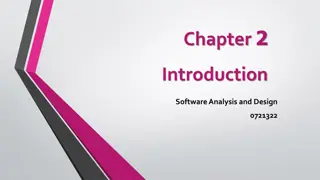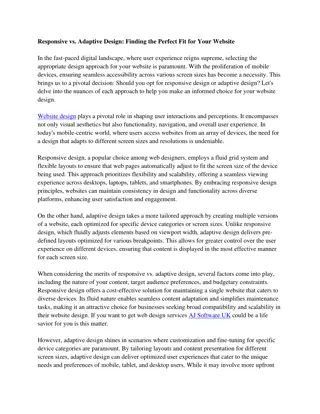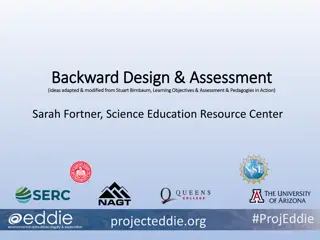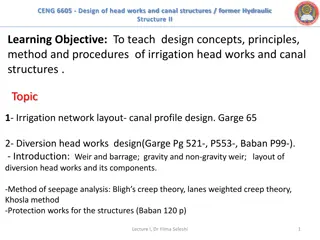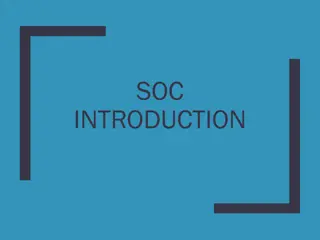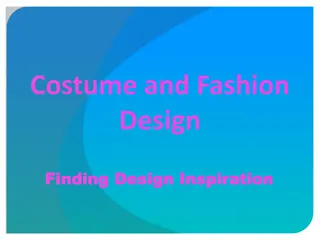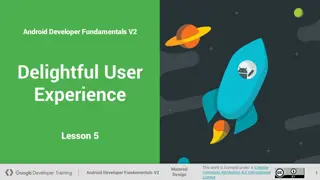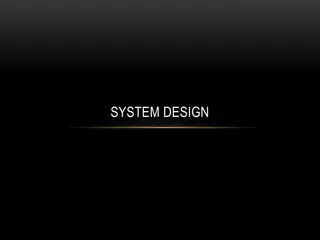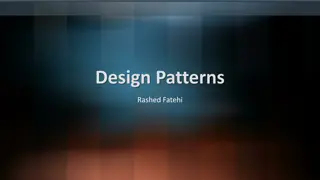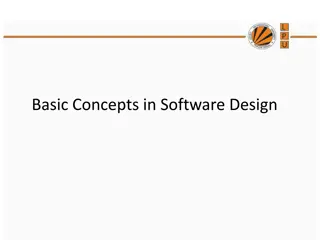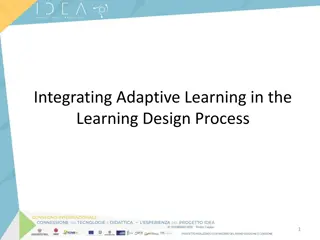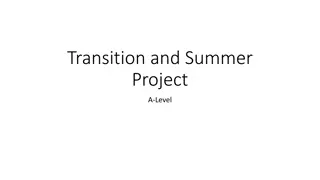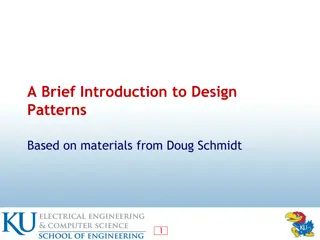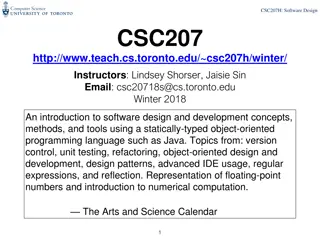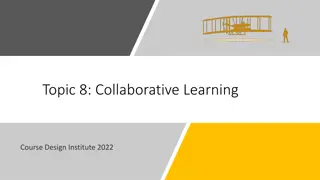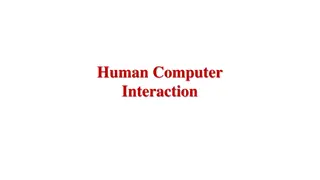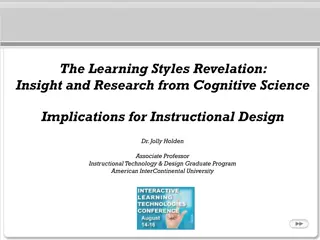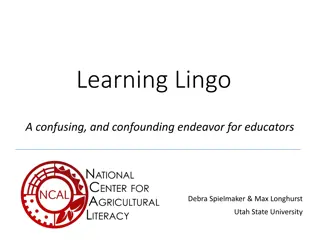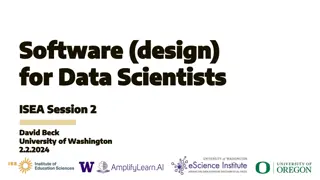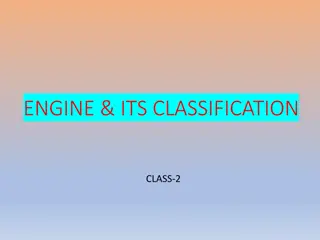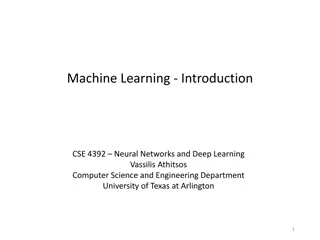GCSE Design Technology Knowledge Organiser and Course Structure Overview
In this detailed knowledge organiser, find information about the GCSE Design Technology course structure, learning objectives, mission statement, and core technical principles for KS4 students. The course emphasizes iterative design cycles, creative thinking, problem-solving, and addressing environm
7 views • 53 slides
Software Analysis and Design Process
Software analysis and design involve a systematic approach to understanding user requirements, creating logical models, and transitioning to detailed design specifications. Requirements analysis focuses on capturing system requirements, while design translates these requirements into implementation
8 views • 16 slides
Universal Design for Learning: Embracing Diversity in Education
Embrace the fluidity of language and diverse learning experiences within the Universal Design for Learning framework. Celebrate learning differences and accessibility. Explore additional technologies to enhance the learning experience, promoting inclusivity and respect for individuality.
6 views • 81 slides
Textil School for Design, Technology, and Management - Overview
The Textil School for Design, Technology, and Management is a renowned institution funded by the European Union. Offering undergraduate applied studies in Textile and Apparel Design, Textile Engineering, and Management in the Textile Industry, the school focuses on artistic expression, modern method
0 views • 16 slides
If you are searching for Architectural Design in Takapūwāhia
If you are searching for Architectural Design in Takap\u016bw\u0101hia, At HWA - Architecture, we bring years of experience in Architectural Design to projects across New Zealand. With ongoing projects in Otago, Canterbury, Waikato, Kapiti, and Horowhenua, we have established ourselves as a trusted
1 views • 6 slides
Exploring Graphic Design Jobs Near Me: Opportunities and Insights
\n In today's visually-driven world, graphic design plays a crucial role in shaping the identity and communication of businesses, organizations, and brands. From logos and branding materials to digital assets and marketing collateral, the demand for skilled graphic designers continues to grow. If yo
1 views • 9 slides
Responsive vs. Adaptive Design: Finding the Perfect Fit for Your Website
In the fast-paced digital landscape, where user experience reigns supreme, selecting the appropriate design approach for your website is paramount. With the proliferation of mobile devices, ensuring seamless accessibility across various screen sizes has become a necessity. This brings us to a pivota
1 views • 2 slides
Enhancing Module Design through UDL Principles by Dr. Liam Morris
Dr. Liam Morris, a lecturer at Atlantic Technological University, explores the integration of Universal Design for Learning (UDL) principles into module design and assessment strategies. His focus is on enhancing transparency, ensuring equity, and promoting further improvements in teaching practices
0 views • 7 slides
Effective Course Design through Backward Assessment for Lasting Learning
Explore the significance of backward design and assessment in creating meaningful learning experiences. Discover key findings in student learning and strategies for developing enduring understandings. Consider what you want your students to remember five years later and the approaches to course desi
0 views • 19 slides
Guidelines for Design of Cement Concrete Pavement and Interlocking Paver Blocks
This document provides guidelines for designing cement concrete pavements and interlocking paver blocks, covering factors governing design, wheel loads, design period, subgrade characteristics, approximate k values based on CBR values, and the importance of a sub-base below concrete pavements. It em
0 views • 67 slides
Experiential Learning Portfolio Program at Barry University
Experiential Learning Portfolio Program at Barry University's School of Professional and Career Education (PACE) offers a unique opportunity to earn college credit for learning gained from work and community service experiences. Through this program, students can showcase their experiential learning
0 views • 16 slides
Software Engineering Design Principles and Concepts
The chapter discusses the essential principles and concepts in software design, highlighting the four key design models - data design, architectural design, interface design, and component-level design. It emphasizes the importance of traceability to the analysis model, minimizing the gap between so
2 views • 36 slides
Design of Head Works and Canal Structures - Learning Objectives and Evaluation
This course covers the design concepts, principles, methods, and procedures related to the design of irrigation head works and canal structures. Topics include irrigation network layout, diversion head works design, seepage analysis methods, protection works, canal profile design, canal head regulat
0 views • 4 slides
Innovative Learning Management System - LAMS at Belgrade Metropolitan University
Belgrade Metropolitan University (BMU) utilizes the Learning Activity Management System (LAMS) to enhance the learning process by integrating learning objects with various activities. This system allows for complex learning processes, mixing learning objects with LAMS activities effectively. The pro
4 views • 16 slides
System on Chip (SoC) Design and Components
Explore the world of System on Chip (SoC) design, components, and working flow. Learn about Intellectual Properties (IP), platform-based design, typical design flows, top-down design approach, and the emerging Electronic System Level (ESL) design flow. Discover the essential components of an SoC, su
0 views • 45 slides
Design Inspiration and Elements in Costume and Fashion Design
Dive into the world of costume and fashion design through a visual journey of finding design inspiration, understanding the design process, emphasizing originality, and exploring different sources of creativity. Discover how technology, art, food, history, architecture, and nature can spark innovati
0 views • 45 slides
Enhancing Piping Design Efficiency with Spec-Driven Technology
Explore how Spec-Driven Piping technology powered by CADACTIVE offers a standardized approach for piping design in Creo Parametric. This innovative extension streamlines design communication, eliminates errors, and improves design efficiency by utilizing a master catalog, automated checking capabili
0 views • 15 slides
Material Design: Combining Classic Design Principles with Technological Innovation
Material Design is a design language that combines traditional design principles with the possibilities offered by technology and science. It emphasizes visual language, classic design elements, and innovation to create delightful user experiences. The Material Metaphor, Imagery, Typography, Color,
0 views • 34 slides
Enhancing English Language Learning for Graphic Design Students
Exploring a corpus-informed approach to materials design for language acquisition at UAL Language Centre, with a focus on content and discourse specific to Art & Design. The background of using learner corpus to inform materials design, collaboration with Graphic Design tutors, and key results relat
0 views • 17 slides
Comprehensive Guide to System Design Components and Techniques
System design involves the detailed planning and identification of components in an information system, aiming to provide users with a general understanding of the new system. This process includes techniques like flowcharts, prototyping, and component design, covering aspects such as output design,
0 views • 24 slides
Design Patterns: A Comprehensive Overview
Exploring the world of design patterns, this content delves into the essence of design patterns, their application in software design to resolve complexity, and the different types of design patterns - creational, structural, and behavioral. It also showcases examples of popular design patterns such
0 views • 22 slides
Basic Concepts in Software Design
Software design involves transforming customer requirements into a form suitable for implementation, with activities categorized into preliminary and detailed design stages. High-level design focuses on module identification and control relationships, while detailed design entails defining data stru
1 views • 24 slides
Enhancing Learning Design with Adaptive Learning Solutions
Explore the integration of adaptive learning in educational design processes to address common challenges such as high drop-out rates and student disengagement. Discover key players in learning design and the benefits of intelligent adaptive learning systems in catering to individual student needs e
0 views • 56 slides
3D Design and Critical Analysis in Architecture
Dive into the world of 3D design and critical analysis with a focus on architecture. Discover the stages of design, essential skills for designers, and areas of study in three-dimensional design. Delve into iconic buildings like Frank Lloyd Wright's Falling Water, analyze their key features, and eve
0 views • 9 slides
Design Patterns in Object-Oriented Design
Design patterns in object-oriented design (OOD) are essential templates that codify best practices for solving common problems. They help streamline development by capturing proven design decisions, promoting code reuse, and enhancing system flexibility and modularity. Learn about the core concepts,
0 views • 20 slides
CSC207H Software Design Course Overview
Winter 2018's CSC207H Software Design course focuses on software design and development concepts, methods, and tools using Java. The course covers topics like version control, unit testing, refactoring, object-oriented design, design patterns, and more. Students are expected to spend 8-10 hours per
0 views • 30 slides
Enhancing Learning Through Collaborative Course Design in 2022
Explore the benefits of collaborative learning in course design at the Collaborative Learning Institute 2022. Discover how engagement, teamwork, and social interaction amplify student learning, leading to improved communication and leadership skills. Dive into short-term partnership activities like
0 views • 16 slides
Interaction Design in Human-Computer Interaction
Interaction design focuses on creating interactive products that are easy, effective, and enjoyable to use. It aims to reduce negative user experiences while enhancing positive ones. Designing interactive products requires understanding user activities, interfaces, and device arrangements to support
0 views • 11 slides
SE2811 Software Component Design Overview
This course covers software component design, design patterns, object-oriented design, algorithms, and opportunities for reuse in systems design. It emphasizes the importance of domain-level design and provides insights into solving core problems through reusable classes.
1 views • 21 slides
Learning Styles and Instructional Design: Debunking Misconceptions
The concept of learning styles as predictors of learning outcomes is widely misunderstood. Research shows little impact on learning outcomes. This presentation explores the implications for instructional design and questions the relevance of considering learning styles as a variable in instructional
0 views • 56 slides
Analysis of Bunch Lengthening in CEPC for Different Design Parameters
This study explores bunch lengthening in the Circular Electron Positron Collider (CEPC) for various design parameters, analyzing a 54 km design scheme, a 61 km design scheme, and a 100 km design scheme. The analysis includes the theoretical framework used, equations for bunch lengthening, and conclu
1 views • 15 slides
Plain & Reinforced Concrete Structures in Design Engineering
In the design of Plain & Reinforced Concrete structures, various strength design methods such as Ultimate Strength Design (USD) and Allowable Strength Design (ASD) are utilized. These methods involve factors of safety, material strength, load factors, and analysis in the elastic range. Additionally,
0 views • 11 slides
Verilog Adder Examples & Typical IC Design Flow
This comprehensive content delves into Verilog adder examples, typical IC design flow, physical design considerations, and examples of OpenGL ES GPU and ARM hypervisor applications. It covers the fundamentals of digital logic with Verilog design, hardware description language, FPGA prototyping, phys
1 views • 27 slides
Learning Lingo: Curriculum and Models in Education
The content delves into the complexities of learning lingo, exploring terms such as learning theory, curriculum theory, instructional models, strategies, and methods in education. It covers various instructional models like Understanding by Design and Universal Design for Learning, providing insight
0 views • 13 slides
Impact of Implementing Learning Design Approaches in STEM over 4 Years
Evaluating the impact of implementing learning design approaches in STEM from July 2017 to July 2021, focusing on practices, products, and processes. The study explores the Open University Learning Design Initiative, principles of learning design, and research questions related to the impact on modu
0 views • 16 slides
The Importance of Software Design for Data Scientists
Today's ISEA Session 2 with David Beck from the University of Washington delves into the critical role of intentional software design for data scientists. The session covers the software design approach, user-centric design stories, use cases, components, testing strategies, and the benefits and dra
1 views • 76 slides
Engine Classification and Design
Engine classification involves categorizing engines based on various factors such as combustion type, number of strokes, cylinder design, and ignition method. Common classifications include external and internal combustion engines, as well as categories based on the design and use of the engine. Add
0 views • 11 slides
Machine Learning: Types and Examples
Machine learning, as defined by Tom M. Mitchell, involves computers learning and improving from experience with respect to specific tasks and performance measures. There are various types of machine learning, including supervised learning, unsupervised learning, and reinforcement learning. Supervise
4 views • 40 slides
Lifelong and Continual Learning in Machine Learning
Classic machine learning has limitations such as isolated single-task learning and closed-world assumptions. Lifelong machine learning aims to overcome these limitations by enabling models to continuously learn and adapt to new data. This is crucial for dynamic environments like chatbots and self-dr
1 views • 32 slides
Enhancing Learning Through Co-Created Interactive Courseware and Learning Analytics
Explore the innovative concept of co-creation in interactive courseware and learning analytics to improve student learning outcomes. Discover how students collaborate in a social learning environment, track their progress, and engage in dialogic and constructive pedagogical strategies. Harness the p
1 views • 19 slides

